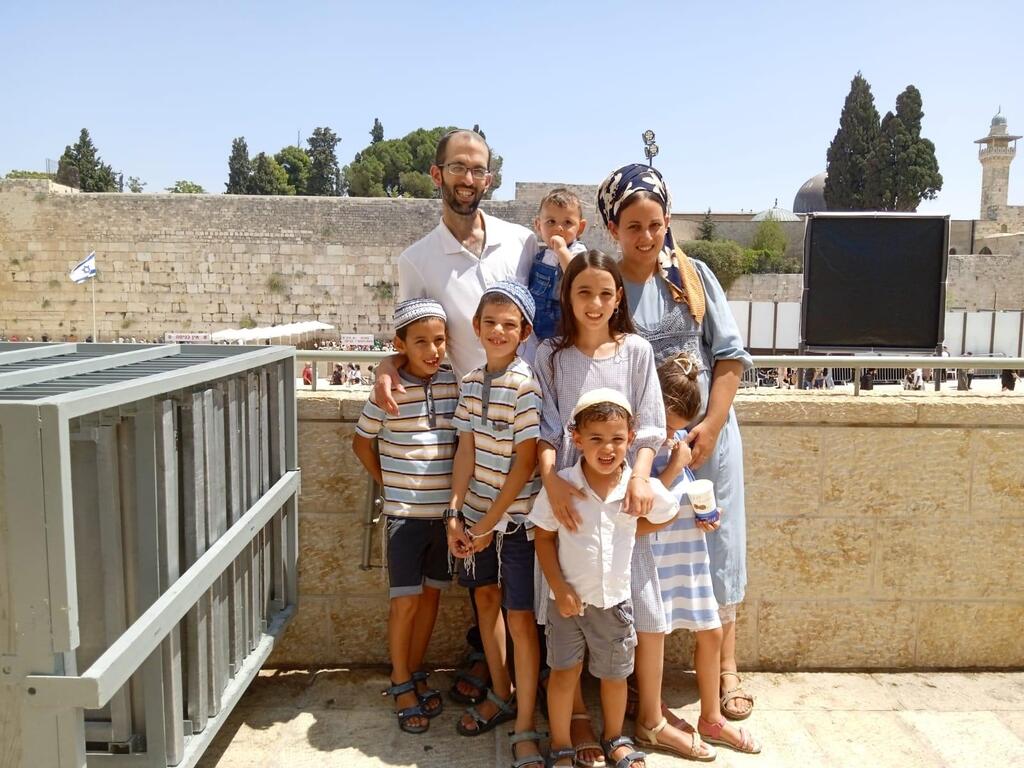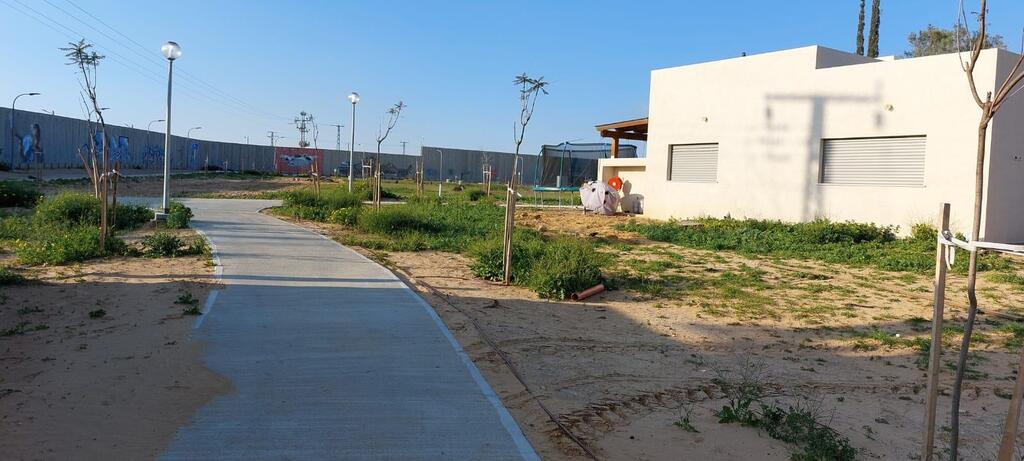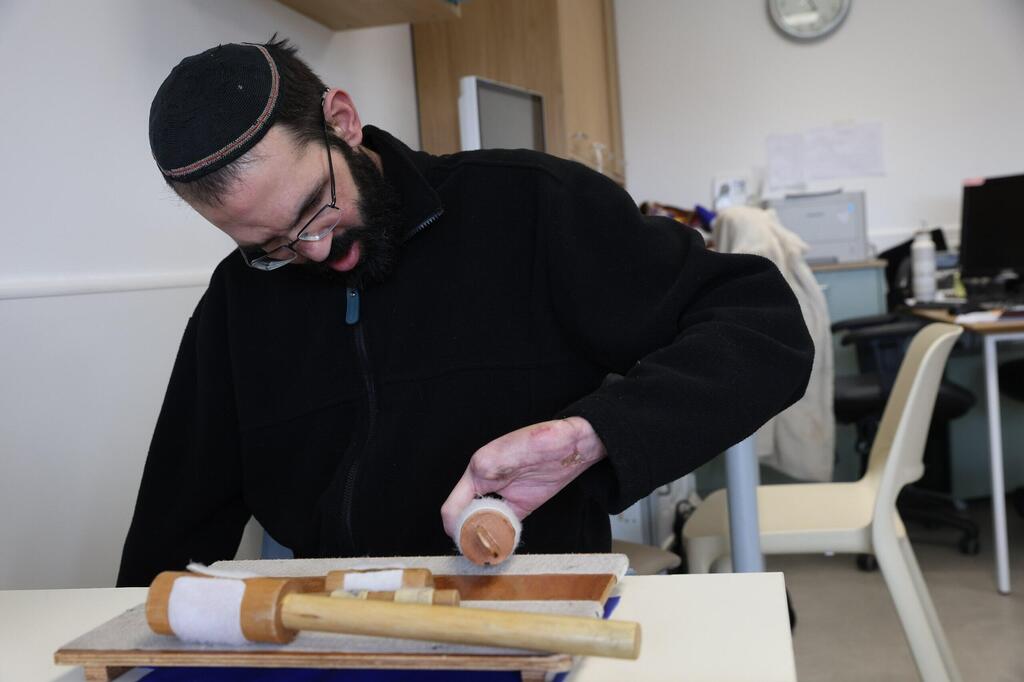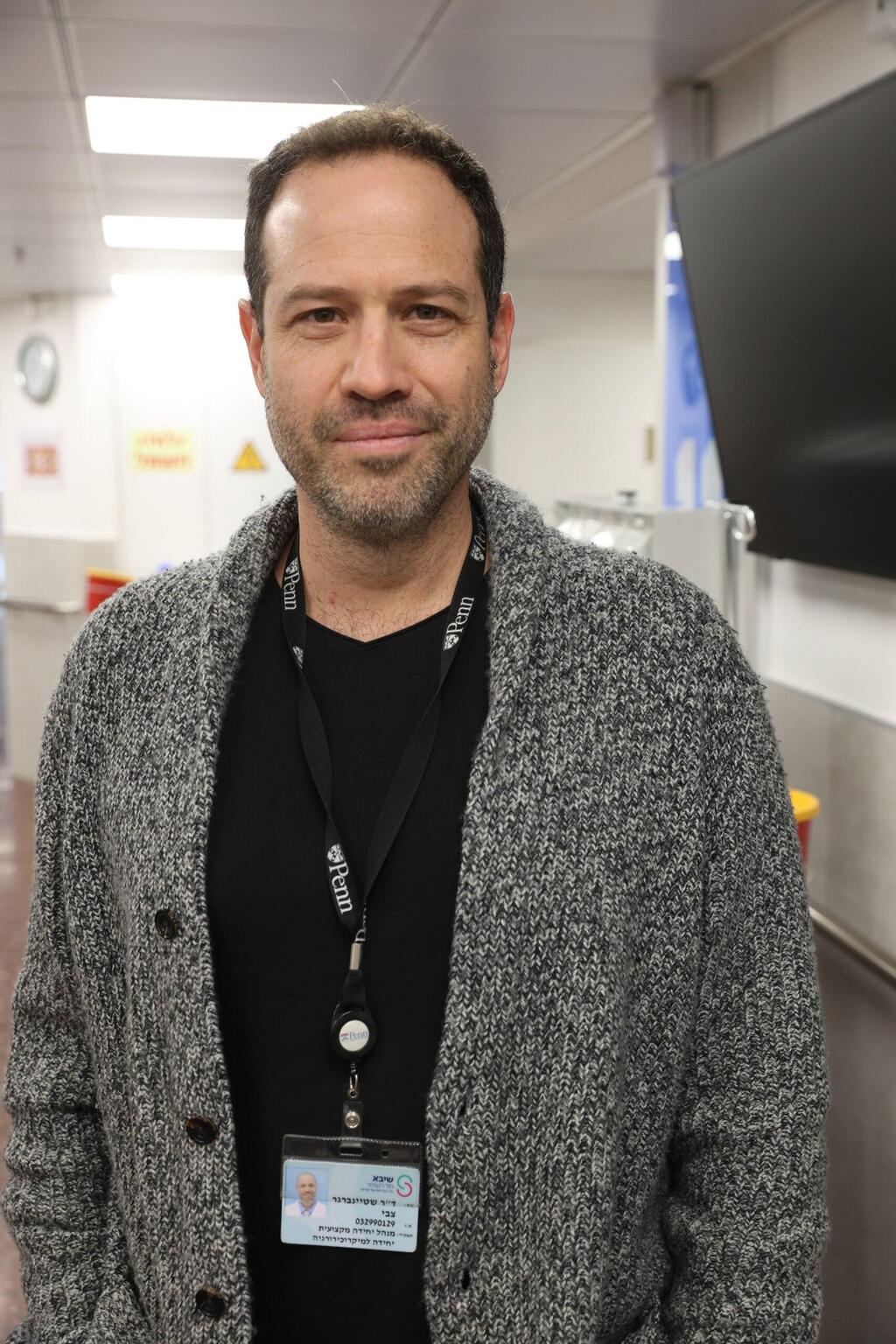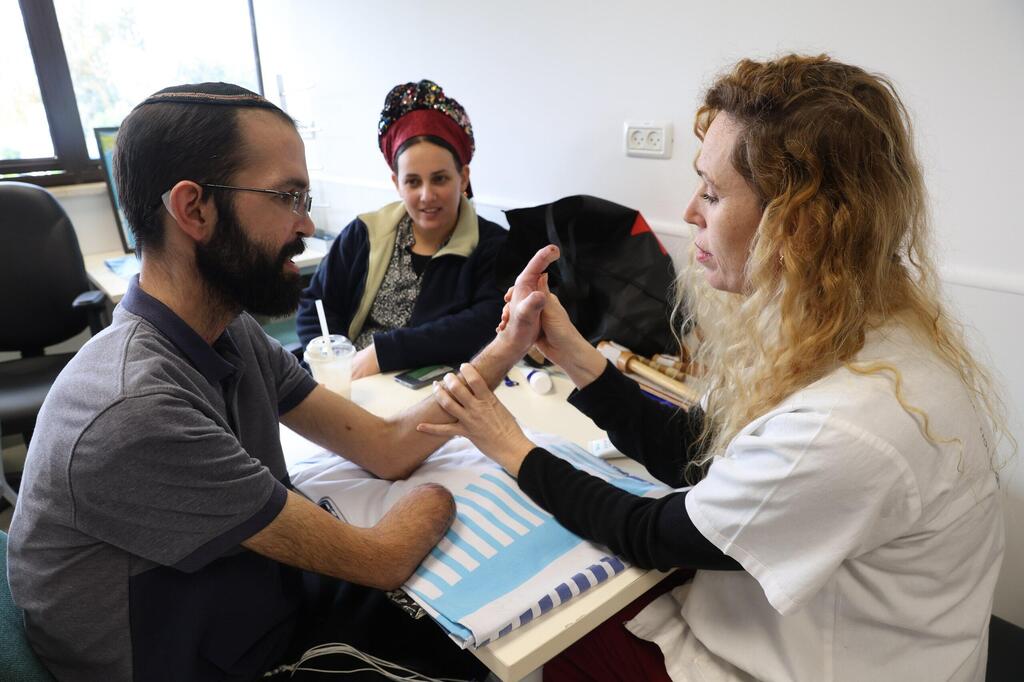The heroic story of Amichai Schindler, 33, from Kerem Shalom gives new meaning to the expression "saving them with his body." Even at more than 120 days since October 7, it is difficult to understand how Schindler, a social worker who treats mentally ill patients and a father of six, and who was critically injured in his home on the kibbutz, survived the inferno. The Hamas terrorists detonated a bomb on the door of the family home's secure room after Amichai, who rewrote the definition for the word bravery, blocked their entrance, leaving him seriously burned and full of shrapnel. The paramedic who treated him recognized him from 13 years ago, when Schindler's brother, the late Avishay Schindler, was murdered in a terror attack in the Har Hebron Regional Council.
Read more:
"We were looking for meaning and a communal life and we arrived at Kerem Shalom," said Avital, Schindler's wife. Amichai and his wife, who lived in Elon Moreh, moved to the southern kibbutz four and a half years ago, where they raise their six children, ranging in age from from 18 months to 11 years old.
Just six months ago, the family moved to their new home located on the western side of the kibbutz, only 50 meters from the border fence and the closest house to the wall that separate Israel from the Gaza Strip. It is also the only house in the kibbutz that was damaged in the terrorist attack. The first responders fought a battle there that redefines the words courage and sacrifice.
The sirens on Black Saturday changed the course of the family's life forever. Avital brought the family members into the house. "Messages from the secretary started popping up on our cell phones telling us to lock ourselves in the bomb shelter because live fire is going off from outside by terrorists who have infiltrated the kibbutz. Around 10:00 a.m., my husband was praying outside the bomb shelter when he heard strange noises inside our house, he entered to shelter and shut the door," Avital recounts.
8 View gallery
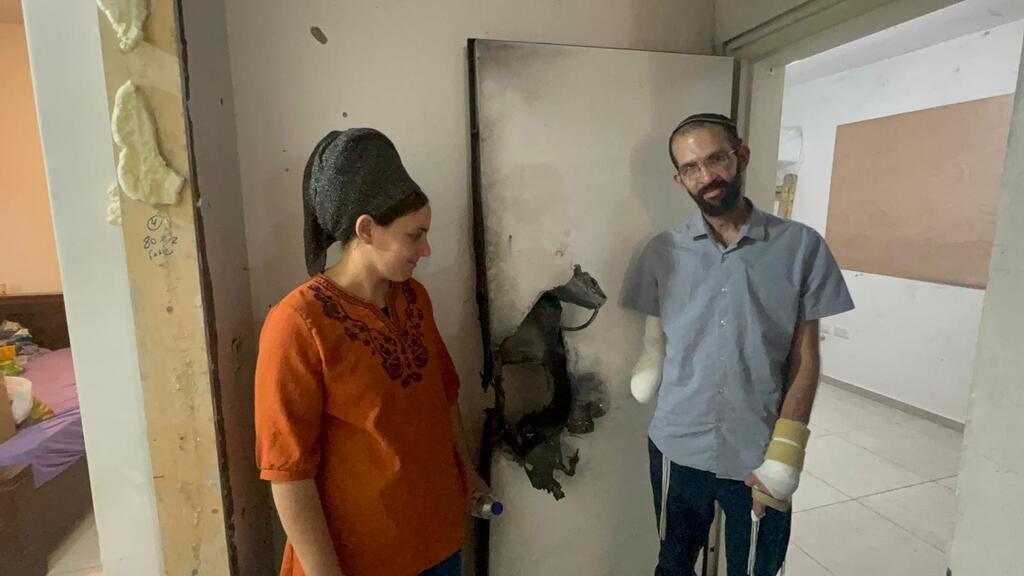

Amichai Schindler and his wife Avital on the way to rehabilitation
(Photo: Family album)
"The terrorists spoke to us in Hebrew and told us to open the door, that they were IDF soldiers. Amichai shouted at them, 'Go away or I will kill you,' and hurried to hold the door of the bomb shelter and block their entry," she said. Avital called the emergency situation room and calmly informed them that terrorists were in their house.
In those seconds, the terrorists attached a powerful explosive device to the door of the shelter. "Suddenly there was a huge explosion, I was sure that we would all be killed. Amichai, who was still holding the door, was hit by a lot of shrapnel. From the blast, he bruised his head when he hit the wall, part of which collapsed on him, he fell on the bed in the shelter and broke it."
Avital and the six children who were sitting in the back and at a distance from the door, were unharmed. The charge pierced the door and the terrorists retreated to the living room. Amichai recalled those moments. "For a reason I don't understand, the terrorists decided to leave our house, instead of entering the breached bomb shelter and finish us all off."
Avital looked at her husband in the shelter and was sure he was dead. She once again called the first responders to her house. "Until I heard him moaning in pain, I didn't believe he was alive. And in this extreme situation, when I constantly heard gunshots from outside, I'm supposed to convey confidence to our six children, who were looking at me with a frightened look."
Avital came to her senses and and spoke to the children. "Listen to me carefully," she told them, "don't look at dad," who was lying soaked in his blood, which was coming from everywhere, including his eyes. "My daughter-in-law asked the children to sing together Psalm 100 for their father's recovery, to pray and sing Sukkot songs," said Amichai's mother, Sigalit Schindler.
She sang and prayed with the thought that even if Amichai did not survive, at least the children were saved," said his mother who, together with her husband Moshe, did not leave Amichai for a moment. Two members of the first responders team, the Amichai Yisrael Witzen and Yedidia Raziel, rushed to Amichai's house. "They intended to evacuate him to the living room, away from the eyes of the children and take care of him, and suddenly he tells them 'don't pick me up, I can walk alone,'" his mother describes.
Senior doctor: "I was sure he was dead"
They placed a tourniquet on the floor in the living room, then, close to the front door, a terrorist surprised them and shot the first responders dead. Witzen, 33, a father of five, as well as Raziel, 31, a father of three, together with the other first responders. Six soldiers from the Nahal Division arrived and were able to repel and kill the 20 terrorists who infiltrated the small kibbutz. This prevented a mass slaughter.
The late Witzen and Amichai knew each other from when they lived in Elon Moreh and who was there for the family tragedy that befell the Schindlers 13 years ago. At that time, at a bend in the road, terrorists ambushed and shot at passenger cars. Along with the late Avishai Schindler, Talya and Yitzhak Imes and the Kochava Even-Haim were murdered.
8 View gallery
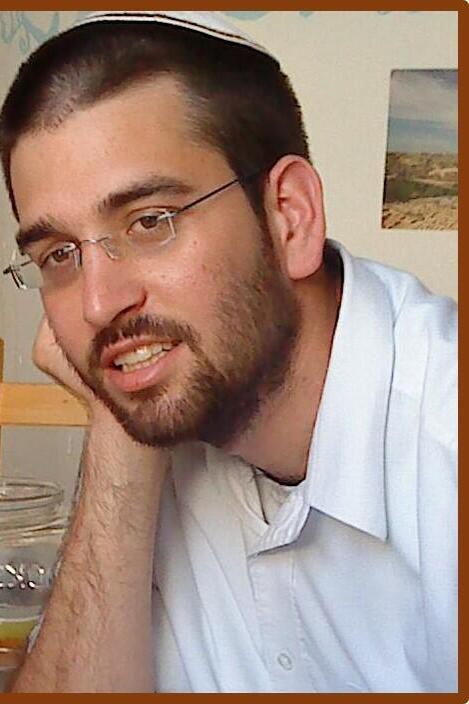

The late Avisahi Schindler was murdered in 2010 in a terror attack
(Photo: Family album)
Already at the entrance to the family home, when he saw Amichai on the verge of death, the Witzen was heard saying: "The Schindler family will never be bereaved again." The fighting intensified and a deafening sound of gunfire was heard throughout the kibbutz. Witzen and Raziel were buried on October 11 at Mount Herzl with the rank of reserve Master Sergeant. The two were recognized as fallen IDF soldiers from the Border Protection Corps along with members of first responder units in other towns who were also killed in combat.
Just an hour and a half after they gave Amichai first aid, they managed to evacuate him to the secretariat, where they opened an emergency operations room to treat the wounded. Yair Wiesner, a Kerem Shalom first responder, was hit by a rocket 40 minutes after evacuating Amichai. He was seriously injured and was blown off his feet from the impact. "I was flown in a helicopter to Sheba, together with Amichai; for three days I was sedated and ventilated and remained alive, because I had a mission to tell about Kerem Shalom. A story of unity that proves it is possible to live together. And that is the national story," he said.
A doctor who was staying at the kibbutz was called to the secretariat. He connected Amichai to an IV and dressed his wounds. For four hours, Amichai lay bleeding and his life was in danger until around 3:30 p.m., when he was put on a military van toward Moshav Bnei Netzerim.
The paramedic had tried to save the life of his brother, the late Avishai. "It took me back," he told the staff, "this time it won't happen. He will live."
Due to the severity of his injury, he was transferred to a field hospital that was opened in the nearby Moshav Naveh. A Magen David Adom paramedic who arrived at the scene looked at the injured Amichai and his eyes widened when he remembered that 13 years earlier he had tried to save the life of his brother, the late Avishai. "It took me back," he told the staff, "this time it won't happen. He will live."
Seven critical hours passed from the moment he was mortally wounded, his right hand was completely crushed and two and a half fingers remained on his left. His face and jaw were crushed, with many fractures in his hands and shoulders as he continued to bleed. Amichai was then taken by helicopter to the Sheba Medical Center.
"The rescue forces were debating whether there was any point in flying him, because he was practically dead, but luckily for my son God sent him the paramedic who remembered the family and challenged himself to save Amichai no matter what," said Amichai's mother. At 6:00 p.m., the evacuation helicopter landed at the hospital, and Amichai was rushed to the trauma room. "I saw him immediately when he arrived," recalls a senior doctor, "and I was sure he was dead."
In their home in Elad in central Israel, the parents Sigalit and Moshe vaguely heard that something happened, but due to the holiday they did not listen to the media. "As soon as Shabbat ended, our son who lives in Lod came to us. He volunteers at Magen David Adom and he was also updated with all the details from Avital. When I saw him, I almost fainted, until he told me, 'Mom, don't worry, Amichai is injured. I don't know how he is doing, he is in Sheba. My husband and I immediately got organized and drove the longest trip of our lives in our son's car from Elad to the hospital."
When they got there, Amichai was already in the operating room, the doctors were fighting for his life and his condition was described as critical. He was transferred, anesthetized and ventilated, and his life was at risk in the intensive care unit, and only three weeks later he regained consciousness. "Because of the ventilator, he still couldn't speak," said his wife Avital, "and I remember telling him: You don't understand the magnitude of the story, but when you do, you will know that you had many intersections along the way where you could have ended your life. Heaven chose us to stay alive." The doctors also wondered how he stayed alive. When he woke up they told him: "What happened to you doesn't make sense, you are a walking miracle."
'Amichai knows that he will not return to the life he had before October 7'
Amichai has since undergone six surgeries, "We were debating whether there was even a chance for the two and a half fingers left on his left hand and we didn't know if they had any potential for rehabilitation and yet we didn't give up. We implanted nerves transferred from other fingers into them and more or less managed to save them," said Dr. Zvika Steinberger, head of Sheba's Microsurgery Unit.
"In this war, we see more limb injuries because the body is protected by a vest from the neck to the pelvis and the head is protected by a helmet, so that only the hands and feet remain exposed. Since October 7, we have treated 200 casualties here in the unit alone. Each of them was operated on an average of three times. These injuries cause disability which changes a life irreversibly, so we make an effort to preserve the limbs. Here at Sheba, we specialize in treating combined injuries, hands and feet, and this requires thinking outside the box," he added.
The challenge of preserving the palms is more difficult to accomplish. "It is very difficult to give up a hand, because the hand defines us. We go out into the world with eyes that see and with hands that touch, feel and caress," according to Steinberger, "There is an excellent alternative to an amputated leg and those with prosthetic legs no longer hide and freely reveal the prosthesis. But an amputated hand is already a disability. Without a hand, the amputee becomes completely disabled and his quality of life is destroyed. And so, when we detect the slightest movement in the hand that was damaged or blocked for too long with a tourniquet, we celebrate," Dr. Steinberger said.
After he regained consciousness, one of Amichai's doctors said: "You brought us a 15-piece puzzle." After a quick initial recovery that surprised even the doctors, Amichai was transferred to the rehabilitation department, where he is resolutely training in physical therapy. The remaining fingers on his left hand are weak and barely functional, but he is determined to move them.
When we visited him in the treatment room, he was sitting in front of a device and it was obvious that he was making an effort to operate it, but did not give up. "We are optimistic and believe that by the strength of his faith and with God's help the fingers will also recover. Amichai knows that he will not return to the life he had before October 7, but he said that from his fatal injury that changed his life forever, Amichai was upgraded," the staff said.
Racheli Bismut, an occupational therapist in the orthopedic rehabilitation department at Sheba Medical Center, is impressed by Amichai's determination.
"As an occupational therapist, I have come across many hand injuries and Amichai's injury is one of the most complex. The moment both of your hands are taken away, the helplessness is immeasurable. You have to be nursed forever. In occupational therapy, the overarching goal is a return to independent functioning and it contains many small and important goals such as independent eating, brushing teeth, dressing, holding hands and other functions that demonstrate the person's independence and give him back the sense of control in his life."
"Amichai is a very special person. Despite the difficulty, frustration has never played a role in Amichai's process. He simply does everything necessary and beyond, endures severe pain, wears painful splints and does not complain at all. He practices over and over again until he succeeds in every task, calmly and peacefully. For him , he already wants to return home to his wife and children. Today, with the help of braces and aids, Amichai is almost completely independent and will soon receive a prosthesis that will give him even more function."
An oasis of secular-religious coexistence
The peace of communal life in Kerem Shalom was violated on October 7 when 20 terrorists breached the kibbutz fence and entered the small community. They were shot and killed by the first responders and the soldiers. A combat helicopter attacked and destroyed another 50 terrorists who were outside the kibbutz.
"But this is not our story," said the kibbutz secretariat. "We want to tell about our ideal kibbutz, where secular people live alongside religious people with respect, appreciation and mutual acceptance. After all, we all came to this oasis out of a deep and critical need to create something different. A mixed partnership and to prove that it is possible."
8 View gallery
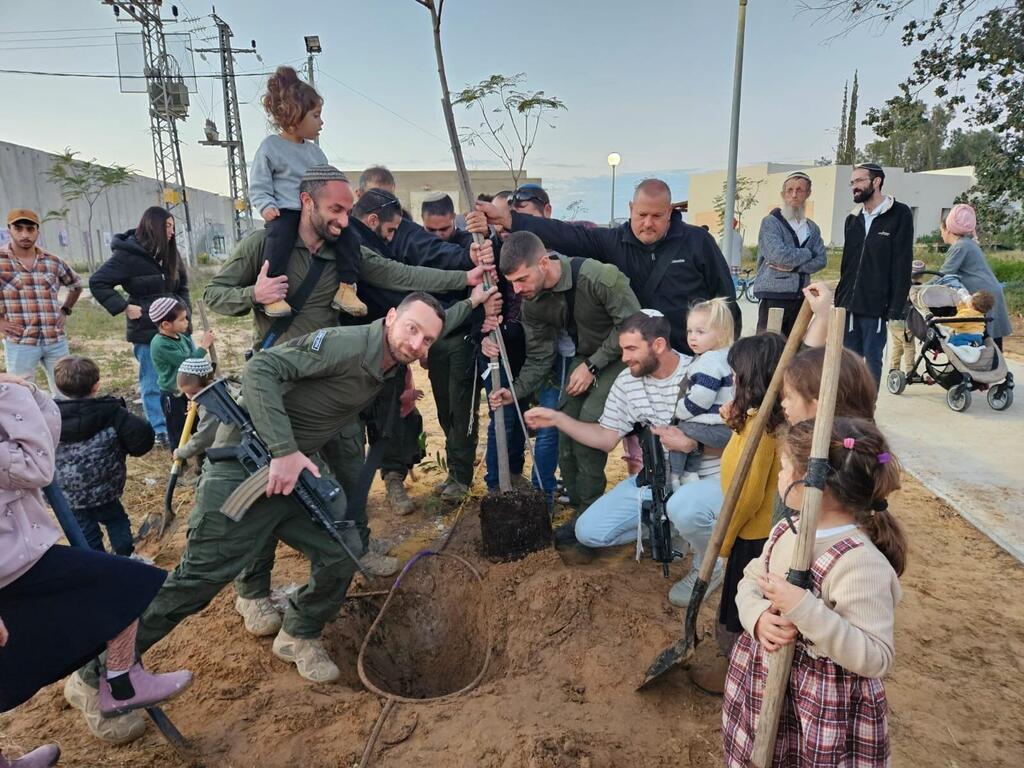

Religious and secular Kerem Shalom residents plant trees for Tu Bishvat
(Photo: Kibbutz Kerem Shalom)
It sounds too ideal, and certainly not simple, but Kibbutz members built a bridge of mutual understanding and appreciation between religious and secular people. "Example? We arrived at the kibbutz in the hot summer of the Negev and the residents, who until we arrived were all from the secular stream, welcomed us with warmth and openness and asked, what do we need to do so that you too will come to the pool?" describes a religious resident.
"On Shavuot eve, over cheeses and wine and with the overwhelming participation of the entire community, we held discussion circles around the topic of the pool. The discussion was open, charged and genuine and above all required openness to listening and flexibility," she said. Deep into the night, a solution was found that would satisfy all the residents: in certain days, the pool would be separated swimming for women and men and the rest of the days the pool would remain mixed.
"The issue of education was our soft underbelly because the council has a religious school and a secular school. So where is the collaboration we dreamed of? We found a solution for that too. In the afternoons there is an informal setting in which all the children participate. If you want to, you can see it's possible," she adds.
When you dive into the details and learn how a new Israeli vision of secular-religious coexistence was woven in the small and threatened kibbutz, can you understand the unequivocal answer of the Schindler family when asked if they intend to return to live there: They are currently looking for a repairman to fix their damaged house.



